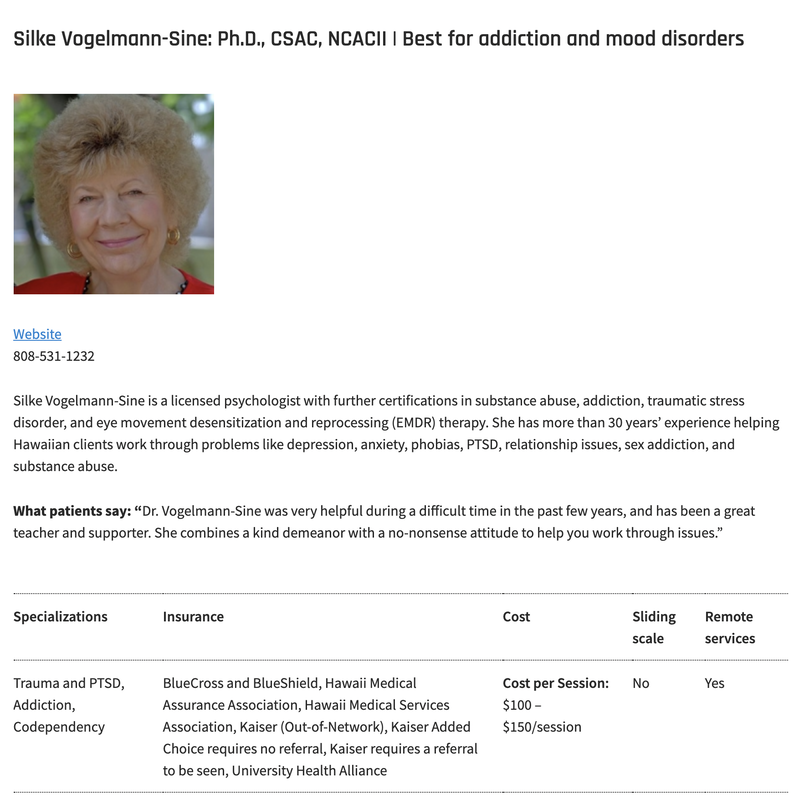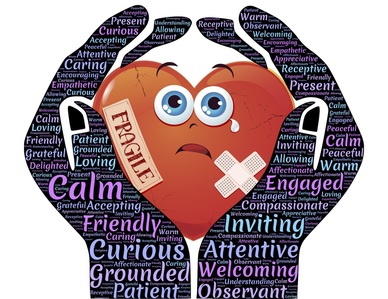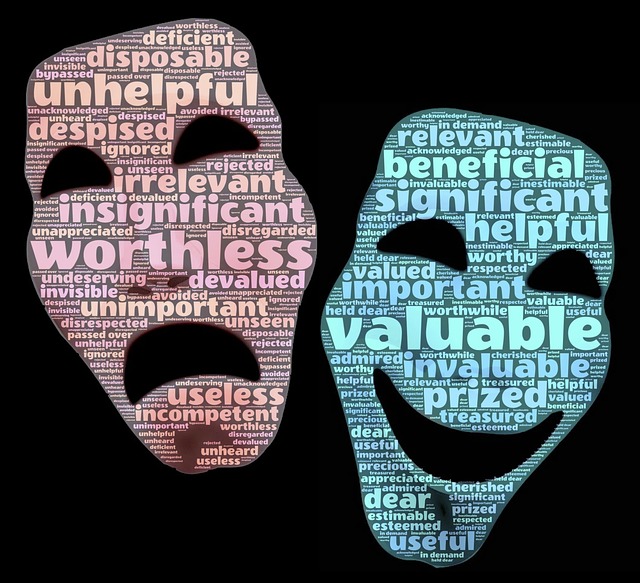|
Sydney was at the end of his rope and despaired when he sought counseling. He lost his job because his company was downsizing. He had worked for the company for 21 years. He applied for many jobs unsuccessfully for six months and began losing hope that he could be hired. He did not open up to close friends because he did not want to be seen as "weak". He started to drink excessively hoping he would feel better. In reality, things got worse.
Once he felt supported and could open up in counseling, he was able to examine his options and choices and realized he needed to approach his job search differently. With new ideas and more hope, he was able to find a new job after a few months. He also decided not to rely on alcohol to feel better. Thank You. Drugs and alcohol can be very seductive. When you feel stressed, angry, lonely, hurt, tired, bored or anxious using substances can bring you immediate relief. The undesirable moods are quickly eliminated and you feel better. As a result you may start to rely on alcohol and drugs to cope.
If you find that you spend time planning to get drugs or alcohol to feel better you may want to examine whether you rely on them too much. Often people close to you may be useful in giving you feedback. It is not easy to face this issue. However, it means that you can search for other ways to cope with difficult emotions. Exercising, meditating, journaling and talking to a professional may help you realize you are stronger than expected and can learn to cope with tough emotions without relying on substances. The benefits of not relying on substances to cope are enormous. Your health, work performance, relationships, communication with others and especially your self-esteem will improve. Thank you. When you feel strong emotions such as anger, frustration, a strong desire or an attraction to another person, impulsive actions can occur. Examples are using alcohol or drugs, gambling, bingeing on foods, getting involved with another person, becoming angry and yelling at someone etc. You may regret your actions afterwards only when you experience negative outcomes. You may hurt your health, someone close to you, or perhaps your job and reputation.
When you experience a strong impulse to do something it is important to take a moment and become mindful of the consequences that can occur. Imagine how your actions will impact yourself and others and make the commitment to make a better choice. In future posts I will discuss how you can become more mindful of different types of impulsive actions. As psychologists we help people overcome impulsive actions and understand underlying issues that are driving impulsive behaviors Thank You.. Do you sometimes feel overwhelmed and get angry because you feel you can't take it any more? Maybe you took on too many tasks and were not able to set boundaries and say "no"? It may be difficult to admit to yourself that you have limits and cannot please all the people that need your help.
You may find it helpful to listen to your inner feelings and learn to be more honest and authentic while at the same time honoring the needs of others. A possible communication may be: I wish I could help you and do this for you, but I simply do not have the time and the energy to do it. I hope you can understand this. A person who cares about you will understand your situation and not make you feel guilty. As psychologists we help people become more aware of their inner feelings because often people are not in touch with their feelings, especially when they grew up with the message that they have to be tough and not cry and learned to suppress feelings.. I invite you to share your experiences regarding feelings. Thank you. You may be scared of your feelings because they can be powerful and overwhelming. If you ever experienced a panic attack you know how scary it can be. Your heart races, you can't think straight, you shake, and some of you might even feel that you are going to die. It's a truly frightening experience, because you have no control over these feelings being triggered. Many people go to the emergency room because they think they think they have a heart attack.
With mental health treatment you can learn how to understand why panic attacks get triggered and how to work with your feelings. The goal is to teach you how to better understand your feelings and manage them so that you don't get so scared of feelings. The more you try to suppress feelings, the more you may feel anxiety. Keeping a journal of your feelings is very helpful to stay aware of what is going on with your feelings and becoming friends with them. Thank You. Do you at times feel worried about things and imagine all the terrible things that could happen? You may ask yourself "what if" this situation should happen and then picture scenarios that are very scary. When this happens you may experience anxiety or even panic attacks.
Suzanne had early stage ovarian cancer, had surgery, and was reassured that all the cancer was taken out and that she was O.K. However, the diagnosis of cancer had frightened her a great deal. When she experienced bloating or intestinal pain she worried that her cancer had come back. She often suffered anxiety attacks thinking the was sick again. In therapy she learned to tell her child self that it was very understandable that she was scared, but that there was no evidence that she had cancer again. She reassured the child self that if symptoms persisted she would check with her oncologist and get tests to determine whether the cancer had come back and get treatment. Suzanne learned to reassure her child self that she was not alone and she would take care of her. With these skills, Suzanne was able to calm herself down and her anxiety decreased`significantly. As psychologists we can teach skill to manage anxiety. Thank You. Iwalani learned as a child that she always had to help her mother who was chronically anxious and overwhelmed. She was expected to make her mother's life easier. Her mother's needs were more important than her needs. As an adult, Iwalani lacked the skills to prioritize tasks and take care of her own needs. She thought of everything she had to do and often freaked out. There was simply not enough time to take care of the kids, her job, the house, the meals, etc.
In therapy, she learned that she had to plan carefully when she would schedule certain tasks to give herself a little time each day to slow down and relax. She also learned to delegate tasks, which was very new to her. It took some time to implement these new behaviors. She talked to her child self and reassured her that within a week generally everything gets done and that she has a right to take things step by step. She became a much more peaceful person. As psychologists, we can teach skills that were never learned. Thank You. The inner child learned about how to think and act from the family he or she grew up with. Paul grew up with a great deal of criticism and rejection. It was very painful for him. As an adult, he became very angry when he was treated with lack of respect. He exhibited a profound sensitivity to perceived rejection. Rejection became a trigger for him. Within seconds he was overwhelmed with rage and anger and acted out these feelings. He yelled and screamed at people and even walked off jobs. Afterwards he felt shameful about his behavior.
In therapy he learned that he could not handle rejection/lack of respect because of his painful past. He learned how to step back from his reactions, validating and acknowledging the feelings of the child self and telling him to be quiet and not act up and think about how to handle the situation in an adult manner. It took some time to learn these skills but Paul felt much better about himself. He became a much nicer person. As psychologists we teach skills he never had a chance to learn. Thank You. Everyone's path is different. Danny was a heavy smoker and minimized his problem. He continued to smoke even though he had a chronic cough and his doctor warned him about lung cancer. Eventually his five year old son was diagnosed with asthma and told Danny that the second hand smoke was contributing to his illness and begged him to stop smoking. Looking into the eyes of his innocent son touched Danny so deeply, that he broke through his denial and committed himself to stop smoking. He realized that he jeopardized his son's health and out of love for his son admitted to himself that he was contributing to the problem.
If you have a habit that affects others negatively, you may want to make an honest examination of yourself and determine whether you are in denial. It is often painful to acknowledge problem areas, but it will pay off in the long run. As psychologists, we assist people in facing problems and working them through. Thank you. |
Archives
September 2021
Categories
All
|
Office Address
|
Silke Vogelmann-Sine, PhD, Inc.
Century Square 1188 Bishop Street, Suite 2705 Honolulu, HI 96813 The office is conveniently located at the corner of Beretania and Bishop Streets in downtown Honolulu. Validated parking is available in the basement of Century Square. The office is located on the bus line. Ph: 808.531.1232 Fax: 808.523.9375 [email protected] |
|
|
Copyright 2020 All Rights Reserved
|











 RSS Feed
RSS Feed